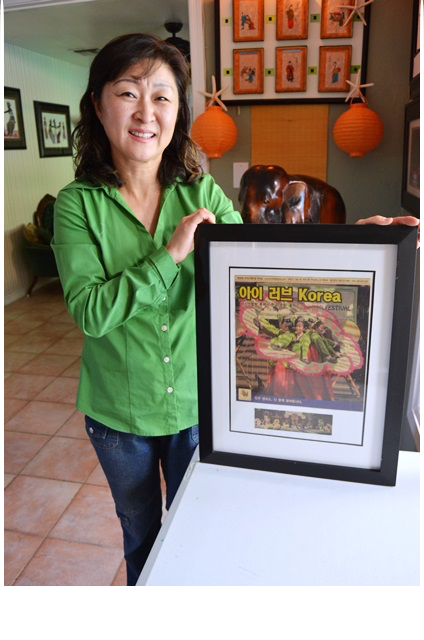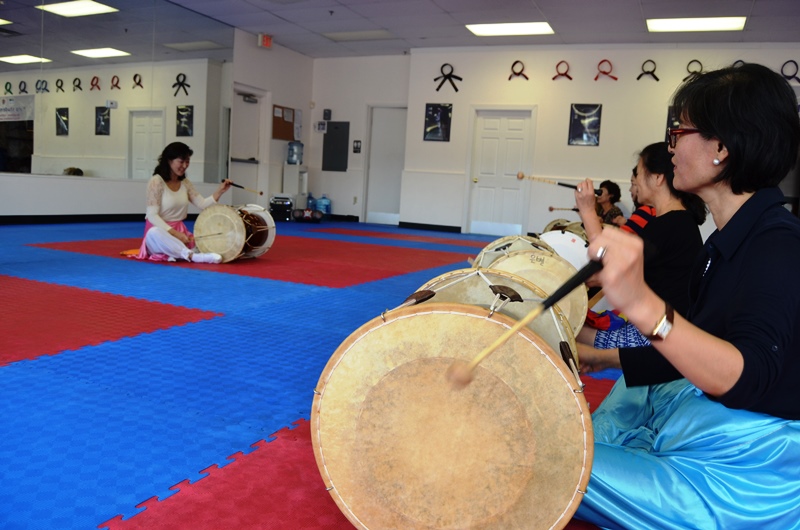Creating space for Korean American identity in Arizona
by Linda ChenListen to this story

Misuk Kujawski remembers the moment when she lost her mother tongue.
“I was on the phone talking with my mom from South Korea and all of a sudden, my Korean was horrible!” said Misuk Kujawski. “It was just so sad. But since I left my country, not speaking, not practicing, naturally I’m losing my language too.”
Kujawski moved into her Scottsdale home 17 years ago. No one else in the neighborhood looked like her, she remembered. Her culture, language, and experiences were suddenly so different than her neighbors.
“I started looking at my next door lady and realized the difference in how we raised our kids,” she said. “My way is the Korean way, and her way is American way. If my kids did something wrong, sometimes I give them punishment. But then I looked at my neighbor. When her kids did something wrong, she talks, talks, and talks! She never gets mad.”
She questioned which way was the right way, but with no one to share her struggles, she soon became lonely.
“You’re losing your identity and all of a sudden, you think, ‘Who am I? Where do I live? How can I live? How can I raise my kids?’ All my experience, my point of view, need to be changed,” Kujawski said.
Harry Kang understands the loss and frustration that comes with moving to the US. He immigrated to Phoenix from South Korea almost 11 years ago. He said daily tasks like going to the grocery store were difficult because of the language barrier.
“I’m using the right sentence and also the right word, but they cannot catch,” said Kang. “That means my pronunciation is the problem, but I keep explain, ‘This, this this.’ But they don’t want to listen. They just try to ignore and say, “What, what what?” When they say like that, I get upset.”
Culture shock, language, and the ability to socially navigate are common stressors for newly arrived immigrants, said Brandon Yoo. He is an associate professor of Asian Pacific American Studies at Arizona State University.
“But part of agency and power is to recognize that these issues of language and adjustment are not all on me,” said Yoo. “It’s not my deficit or personality that makes it difficult to adapt, but there is an absence of social resources or attitudes of multiculturalism where I live.”
“The Korean Community is very small in Arizona”
There are about 15,000 Korean Americans who live in Maricopa County, according to 2010 Decennial Census data, That’s a sizeable population, but they’re all spread out, said Harry Kang. He said the community suffers because it doesn’t have a centralized spot where Korean American residents can meet, shop, and hold events.
“You can only meet at church or market, but if I lived in California or New York, everybody can speak Korean there, even the bank. Not here,” he said.
Misuk Kujawski agreed.

“If you’re not attentively involved in the Korean community, you just don’t know anything about what’s going on,” said Kujawski. “It’s not good. You’re losing that social relationship. Then I thought about it. It’s not the way. I need to find myself again.”
“I want to make something for the Korean community.”
Kujawski noticed there was something missing in the Korean American community. The community offered computer and piano classes, but no Korean cultural classes.
“I used to teach Korean drums and dance in Korea,” she said. “I thought that small talent will give some hope to Korean people because they miss their Korean culture and don’t have a chance to practice it since they left their country. So I started teaching dance and drums.”
Now at a small Taekwondo studio in Phoenix, Kujawski teaches Korean drum and dance classes three times a week.
“They really love it,” she said. “Whenever you have a class together, it’s so much fun! Just seeing each other is fun. But when we start talking about how we live after leaving our country, I realized everyone has stories, just like me.
Kang, too, wanted to fill a need in the Korean community. He’s working with his boss Brian Lee to set up a Koreatown in Mesa.
“This area, long time, die. Almost gone,” said Kang. “But the city of Mesa is trying to set up a redevelopment area here so that’s why we purchased this plaza.”
He said the Koreana Plaza will have a variety of businesses including a supermarket, restaurant, hair salon, and even an independent Korean theater that can sit up to 350 people. The plaza will also be the new headquarters for the Arizona Korean Association where members can meet and host events and festivals.
When the society at large lacks resources for newcomers, ASU Professor Brandon Yoo said that responsibility is taken up at the micro level.
“How agency and power happens in those cases are through individuals trying to figure out what specific programs and organizations they can set up to help run their community as well as other communities at a larger level,” he said.


Kujawski said the goal is not to completely seal the Korean community but celebrate its multiple cultures.
“We always missing our country, but we appreciate living in this America for giving us so many hopes,” she said at a recent Korean drum lesson gathering.
Yoo said that’s all part of the assimilation process.
“Some people believe that you have to sacrifice your old culture to be able to participate in the new culture,” he said. “But as we see in the literature with immigrants, they don’t usually follow or abide by this assimilative model. We see complex ways in which individuals and communities interact to balance their old and new culture.”
This balance, said Misuk Kujawski, is the ultimate goal to unite and empower the Korean American community.
“My hope is we, Koreans teach our identity to our next generations,” she said. “So they knows who they are. They are American but your roots are Korean. What makes you? What forms you? That is identity.”


Linda Chen
Linda Chen is a producer for Georgia Public Broadcasting’s “On Second Thought.”
She got her start in radio by writing and producing stories about Georgia’s refugee community for a community radio station near her college campus. Since then, her work has appeared on ABC News, NPR.org and Public Broadcasting Atlanta.
She is a proud Georgia native and graduated from Emory University with a degree in journalism and international studies. When she’s not producing radio stories, you can find her drinking lots of coffee and snapping photos for On Second Thought’s Instagram page.
